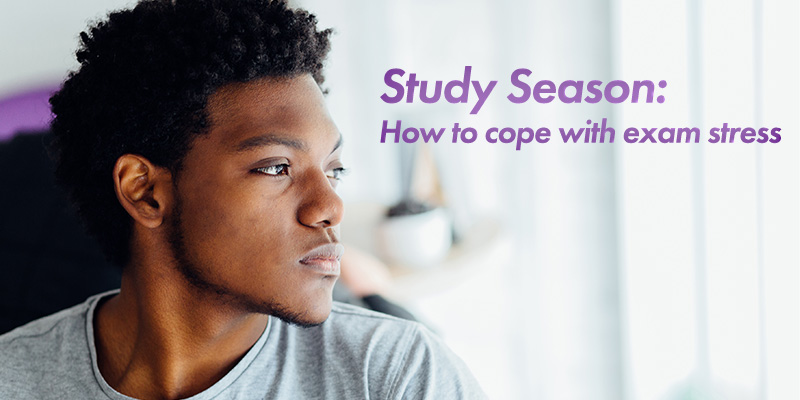
Although there are a rare few who could nail an exam paper in their sleep, heart palpitations, sweaty palms, and contorted guts are part of the territory for most people. But while small amounts of stress may help your exam performance, teetering into full-blown panic can be a hindrance. Thankfully, there are many ways to shake off study stress when it strikes.
Preparation is key
When it comes to exams, you have to create a plan that works best for you. This is down to the individual, but there are some key questions that can help to get you thinking about the priorities.
When should you start revising for exams?
Being organised during exam seasons pays dividends. Break down your revision into small, bite-sized chunks, and then work out what you need to prioritise. Set yourself realistic goals and create a manageable timetable.
What is a ‘good’ study break?
NEWSFLASH: you don’t need to work all day, every day during exam season. Taking regular breaks facilitates learning, supports productivity, and – most importantly of all – prevents burnout. You may wish to use the Pomodoro Technique as you revise: work solidly on a task for 25 minutes, then take a 5-minute break. Once you’ve completed four blocks, you get to indulge in a longer 20-minute break.

What about study groups?
Although study buddies may be helpful, comparison is the thief of joy so try not to compare fellow students’ revision to your own. Listening to other people reel off how much they’ve learned might only serve to stress you out. Think carefully about how much you bring up the subject of revision and exams in social situations. And if you do want to revise with another student, choose wisely. Avoid individuals who will stress you out.
How much water should you drink a day?
Don’t forget to stay hydrated. Even mild dehydration can lead to lethargy and hijack your study sessions. Aim for at least six to eight glasses of water every day. Tip: Always have a big bottle of water on your desk to prompt you to sip while you work.
Does sleep have a big impact?
Sleep can often take a backseat during study season. There’s always the lingering temptation to pull all-nights to cram in last-minute revision, and rest is often neglected. However, sleep is the elixir of life and getting quality rest every night is the single most effective thing you can do to support your mind and mental health as you revise. Find out more about why sleep is so important during exam season here.
How to deal with exam stress and anxiety
When exam stress and anxiety inevitably strikes, try not to worry. Every student experiences the same concerns and feelings. Luckily, we have some tips that can help to ease the stress and pull you out of the anxiety cycle.

Spend time in nature
Nature can be a source of great solace in times of worry and stress; it reminds us that there’s always light beyond the clouds. And what better way to forget about exams than basking in a peaceful landscape, away from the noise of screens and revision.
Make a conscious effort to spend time in green space every day – even if it’s for 10 minutes – while you revise.
Have self belief
Think about every single thing you’ve achieved up until this moment. It’s a pretty impressive list, right? Have faith in yourself that you’ll take revision in your stride and tackle anything thrown at you in the exam hall. Remember, you don’t need to strive for perfection. Being good enough is always enough.
Ask for help
We need to clarify one thing: asking for help is not a sign of weakness. And in a society where most people are reticent to reach out for support, asking for it actually takes tremendous strength and bravery.
If your revision is getting the better of you, please talk to someone. Your friends, family, teachers, personal tutors, and even professionals, like your GP or therapist, are all there to counsel you in whatever capacity you need at the moment.
Quick-fire anxiety tips
Anxiety often operates in a cycle that can, at times, feel impossible to break. Next time you experience the onset of revision-panic, try one of these quick releases to get off the hamster wheel of worry:
• Have a hot bath or cold shower
• Watch a funny video and roar with laughter
• Shake your body vigorously for 1 minute
• Get up and dance
• Call a good friend
• Write all your worries down
• Practice 2 minutes of deep belly breathing
• Try 5 minutes of meditation
• Have a good cry
• Do some yoga
• Spend time with a pet
• Read a book


What are the best vitamins to reduce stress and anxiety?
Multivitamins
Managing busy study schedules and deadlines can affect healthy diet choices. Taking a comprehensive multivitamin formula will plug any nutritional shortfalls.
Magnesium
Magnesium is colloquially known as ‘nature’s soother’ thanks to it contributing to normal psychological function, which may be particularly useful at this time. Find it in: avocados.
L-theanine (18+)
Most people are familiar with that nice-cuppa-tea feeling. And it just so happens the amino acid, L-theanine, may be responsible for making the nation’s favourite brew oh-so-soothing. Find it in: black tea.
Overall, it’s important to pack plenty of brain food into your diet as you revise. Learn more about brain loving nutrients for exam season here.




